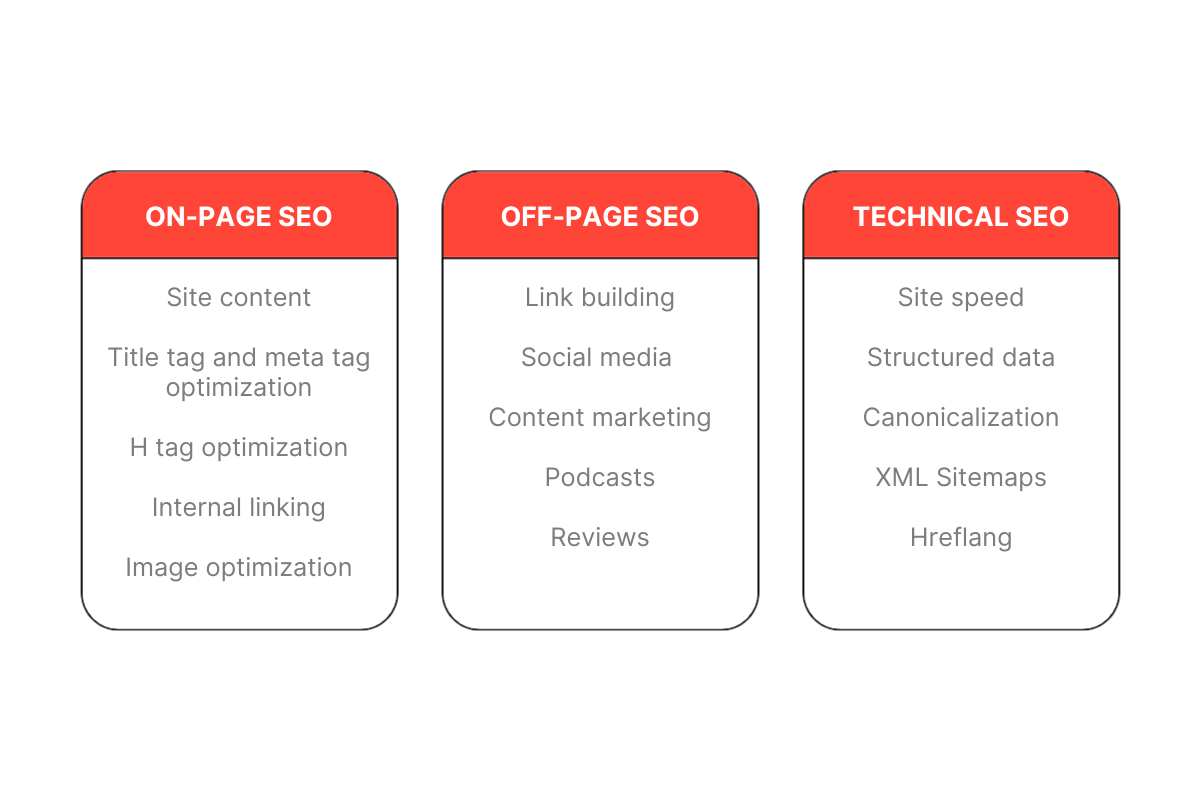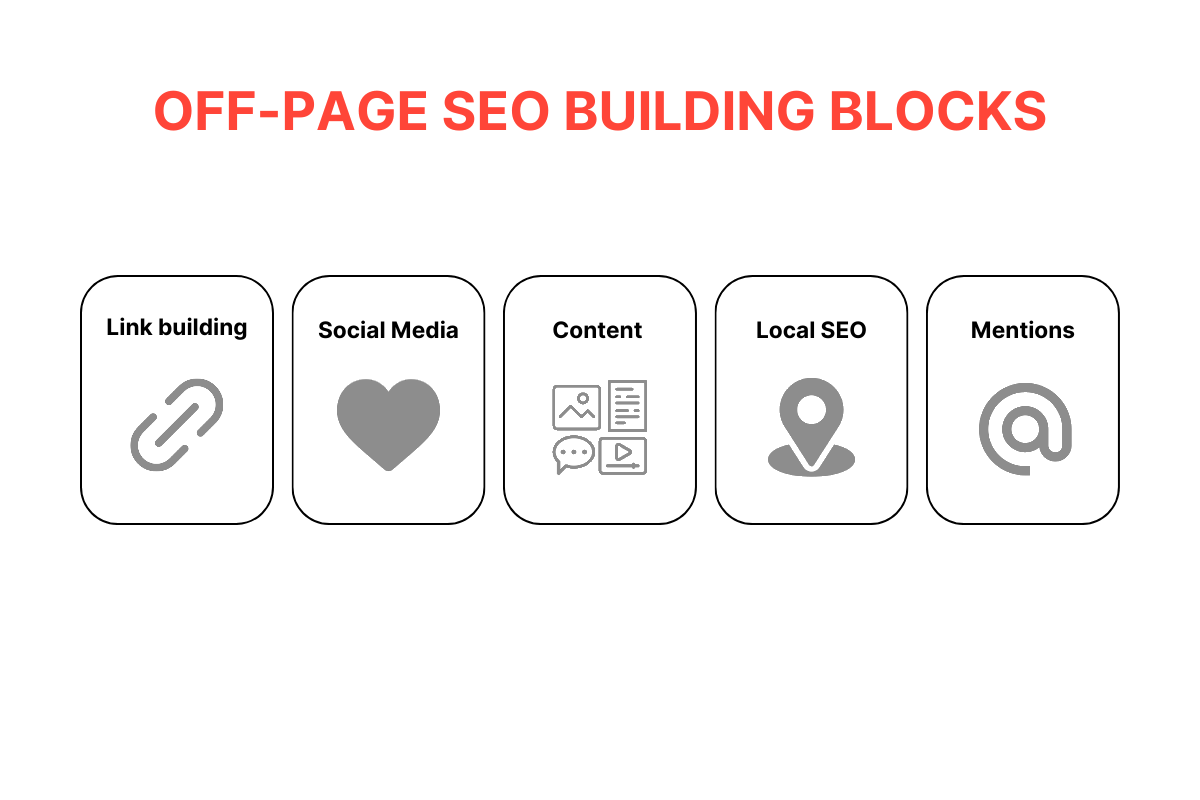Introduction: Unlocking the SEO treasure chest
In today’s digital world, search engine optimization (SEO) has become an indispensable tool for businesses and content creators alike. It’s a game of cat and mouse with search engines, and mastering it can put your website on the map—literally. While on-page SEO primarily focuses on optimizing your website’s content and structure, and technical SEO comes into play when optimizing the technical elements of your website, it’s crucial not to overlook the other aspect: off-page SEO.
So, what is off-page SEO? It’s time to lift the veil on this mysterious digital marketing aspect and dive deep into the world of off-page optimization.
What is off-page SEO?
Off-page SEO refers to the activities and strategies implemented outside of your website to improve its visibility, credibility, and authority in the eyes of search engines and users. It’s the behind-the-scenes work that helps your website climb the search engine rankings. By enhancing your online presence and reputation off-page SEO ultimately drives more organic traffic to your site.

The building blocks of off-page SEO
To make sense of off-page SEO, let’s break it down into its essential components:
- Link building: Acquiring high-quality backlinks from authoritative websites is a key element of off-page SEO. The more valuable backlinks you have, the more credibility your site gains in the eyes of search engines.
- Social media: Engaging with your audience on social media platforms helps create a buzz around your brand and increase its exposure.
- Content marketing: Producing high-quality, shareable content is a surefire way to get noticed by search engines and users alike. This often leads to natural backlinks and improved site authority.
- Local SEO and citations: Optimizing your website for local search is crucial for businesses targeting a specific geographical area.
- Online reputation management: Keeping track of your brand’s reputation and addressing any negative feedback or issues can go a long way in enhancing your site’s image.

The art of link building
Link building is the cornerstone of off-page SEO. It involves acquiring backlinks from other websites, which act as “votes of confidence” for your site’s credibility and relevance. Let’s explore some effective strategies for link building:
Types of backlinks
- Natural backlinks: These are the links that other websites give to your content without any action on your part. They often result from producing high-quality, shareable content.
- Outreach backlinks: These are the links you actively pursue by reaching out to other website owners or bloggers and requesting a link back to your content.
- Self-created backlinks: This includes links from directories, press releases, and forum signatures. While some can be helpful, others can be seen as spammy by search engines, so tread carefully.
Strategies for building quality backlinks
- Guest blogging: Writing guest posts for reputable websites in your industry can help you gain valuable backlinks and exposure.
- Broken link building: Identify broken links on other websites and offer your content as a replacement, securing a backlink in the process.
- Skyscraper technique: Find popular content in your niche, create something even better, and then reach out to the sites linking to the original content to link to yours.
Social media and off-page SEO
Social media is a powerful tool for off-page SEO. By engaging with your audience on popular platforms like Facebook, Twitter, and Instagram, you can create buzz around your brand, drive traffic to your site, and even gain backlinks. Here are a few tips for leveraging social media:
Tips for social media success
- Consistent branding: Ensure that your social media profiles reflect your brand’s identity and messaging for a cohesive online presence.
- Share engaging content: Post content that resonates with your target audience and encourages them to share, like, and comment.
- Join relevant groups and communities: Participate in online discussions and share your expertise to establish your brand’s authority in your niche.
Content marketing: The fuel for off-page SEO
Content marketing is an essential component of off-page SEO. By creating high-quality, shareable content, you can attract organic backlinks, engage your audience, and improve your website’s search engine ranking. Here’s how to create content that hits the mark:
Crafting content that stands out
- Know your audience: Understand your target audience’s preferences, pain points, and interests to create content that truly speaks to them.
- Focus on quality: Prioritize producing well-researched, in-depth content that provides value to your readers and sets your brand apart.
- Embrace multimedia: Incorporate various formats, such as videos, infographics, and podcasts, to cater to different audience preferences and increase shareability.
The power of local SEO and citations
Local SEO is a specialized branch of SEO that focuses on improving your online visibility, attracting local visitors, and increasing brand recognition within your community. It offers numerous advantages, and the citations you create not only enhance your local SEO efforts but also strengthen your overall off-page SEO strategy. This combination ensures that your business thrives in the competitive digital landscape.
Boost your local SEO: 4 essential tips for off-page success
- Optimize your Google Business Profile: Ensure your Google My Business listing is complete and up-to-date, providing accurate information about your business.
- Maintain consistent NAP (Name, Address, and Phone) citations: It’s crucial to ensure that your NAP information remains consistent across all online directories, social media platforms, and your website.
- Encourage reviews and testimonials: Encourage your customers to leave positive reviews online, which not only builds trust, but also boosts your local SEO efforts.
Online reputation management: Guarding your brand’s image
Managing your brand’s reputation online is a crucial aspect of off-page SEO. By addressing negative feedback, monitoring brand mentions, and engaging with your audience, you can protect and enhance your website’s image in the digital space.
Steps for effective online reputation management
- Monitor your brand: Use tools like Google Alerts and Mention to track online conversations about your brand and stay informed.
- Respond to negative feedback: Address any negative feedback or issues promptly and professionally to demonstrate your commitment to customer satisfaction.
- Engage with your audience: Actively participate in conversations related to your industry or niche. Show genuine interest and provide useful information to build trust and credibility.
Frequently Asked Questions (FAQs)
Q: What is the difference between on-page and off-page SEO?
A: On-page SEO focuses on optimizing your website’s content and structure to make it more attractive to search engines. Off-page SEO, on the other hand, involves activities outside of your website aimed at improving its visibility, credibility, and authority.
Q: Why is off-page SEO important?
A: Off-page SEO is vital because it helps search engines perceive your website as relevant, trustworthy, and authoritative. By building high-quality backlinks and strengthening your online presence, you can improve your search engine ranking and drive more organic traffic to your site.
Q: How do I get started with off-page SEO?
A: Begin by identifying your target audience and creating high-quality, shareable content. Then, focus on building backlinks through guest blogging, broken link building, and outreach. Engage with your audience on social media and maintain a positive online reputation.
Q: How long does it take to see results from off-page SEO?
A: Off-page SEO is a long-term strategy, and results can take several months to materialize. Consistently implementing off-page SEO techniques over time will yield the best outcomes.
Q: Can I do off-page SEO on my own, or do I need to hire an expert?
A: While it’s possible to perform off-page SEO independently, hiring an expert can save you time and ensure that you’re using the most effective strategies. A skilled SEO professional can help you devise a comprehensive off-page SEO plan tailored to your specific needs.
Q: Are backlinks the only factor in off-page SEO?
A: Although backlinks play a significant role in off-page SEO, other factors like social media engagement, content marketing, and online reputation management also contribute to your website’s overall off-page SEO performance. A well-rounded off-page SEO strategy should include all of these elements.
Conclusion: Off-page SEO as the key to success
Off-page SEO is a vital piece of the digital marketing puzzle. By understanding and implementing off-page SEO strategies, you can bolster your website’s credibility, authority, and visibility, ultimately driving more organic traffic and boosting your search engine rankings.
Remember, off-page SEO is a long-term investment, and consistency is key. Regularly producing high-quality content, building valuable backlinks, engaging on social media, and managing your online reputation, will set the stage for sustained success in the ever-evolving digital landscape.
So, don’t wait any longer! It’s time to dive into the world of off-page SEO. Our committed performance marketing team is here to offer personalized guidance and unwavering support. Take the leap and get in touch with us to unlock the true potential of your online presence.



